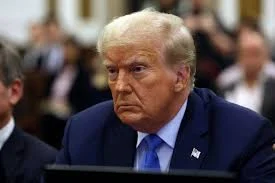USA President Donald Trump
Donald John Trump, the 45th President of the United States, remains one of the most polarizing and unconventional figures in American political history. Serving from January 20, 2017, to January 20, 2021, his presidency was marked by significant achievements, controversies, and a distinctive approach to governance that defied traditional norms.
Early Life and Career
Born on June 14, 1946, in Queens, New York, Trump grew up in a family involved in real estate development. He graduated from the Wharton School of the University of Pennsylvania in 1968 and joined his father’s company, which he later renamed the Trump Organization. Over the decades, Trump built a business empire encompassing real estate, casinos, golf courses, and a notable presence in entertainment through his reality TV show, The Apprentice.
Entry into Politics
Before running for president, Trump had flirted with political ambitions for years, considering bids as early as the 1980s. In 2015, he formally announced his candidacy as a Republican, focusing on themes of "Make America Great Again," immigration reform, and economic revival. His brash rhetoric and outsider status resonated with many voters, leading to his unexpected victory over Democratic candidate Hillary Clinton in the 2016 presidential election.
Key Policies and Actions
Trump’s presidency was defined by several landmark policies and initiatives, including:
1. Economic Growth and Tax Reform: Trump signed the Tax Cuts and Jobs Act in 2017, which lowered corporate and individual tax rates. During his tenure, the economy experienced growth, with historically low unemployment rates until the COVID-19 pandemic.
2. Immigration and Border Security: A cornerstone of Trump’s campaign, his administration focused on curbing illegal immigration, including building sections of a border wall with Mexico and instituting travel bans on certain countries.
3. Judicial Appointments: Trump appointed three Supreme Court justices—Neil Gorsuch, Brett Kavanaugh, and Amy Coney Barrett—shaping the judiciary for decades to come.
4. Foreign Policy: Trump adopted an "America First" approach, renegotiating trade deals like NAFTA (replaced by the USMCA), withdrawing from the Paris Climate Agreement, and engaging directly with North Korean leader Kim Jong-un. His administration also brokered the Abraham Accords, normalizing relations between Israel and several Arab nations.
EARN MONEY ONLINE DAILY 8$/HOUR CLICK HERE
5. COVID-19 Pandemic Response: The pandemic defined the latter part of Trump’s presidency. His administration launched Operation Warp Speed, leading to the rapid development of COVID-19 vaccines, but his handling of the crisis, including messaging around public health measures, faced widespread criticism.
Controversies and Impeachments
Trump’s presidency was marked by numerous controversies, including allegations of Russian interference in the 2016 election and the Ukraine phone call scandal. He became the first U.S. president to be impeached twice—once in 2019 over the Ukraine scandal and again in 2021 for incitement of insurrection following the January 6 Capitol riot.
Post-Presidency Influence
After leaving office, Trump has remained a dominant figure in the Republican Party. Despite legal challenges and ongoing investigations, he announced his candidacy for the 2024 presidential election, signaling his intent to remain a key player in American politics.
Legacy
Donald Trump's presidency is often viewed through starkly contrasting lenses. Supporters praise his economic achievements, judicial appointments, and tough stance on immigration and foreign policy. Critics, however, highlight his divisive rhetoric, handling of the pandemic, and challenges to democratic norms.
In hindsight, Trump's impact on the U.S. political landscape is undeniable, reshaping the Republican Party and influencing the nation’s political discourse in profound ways.




